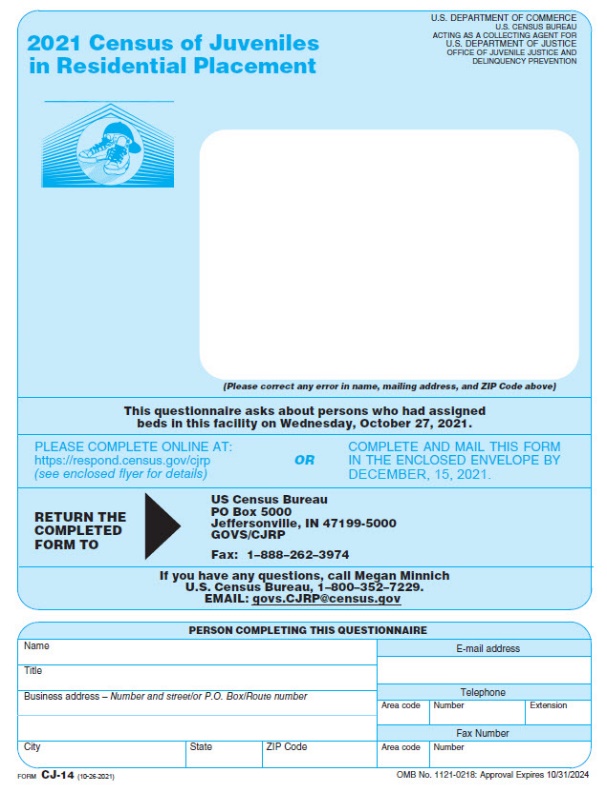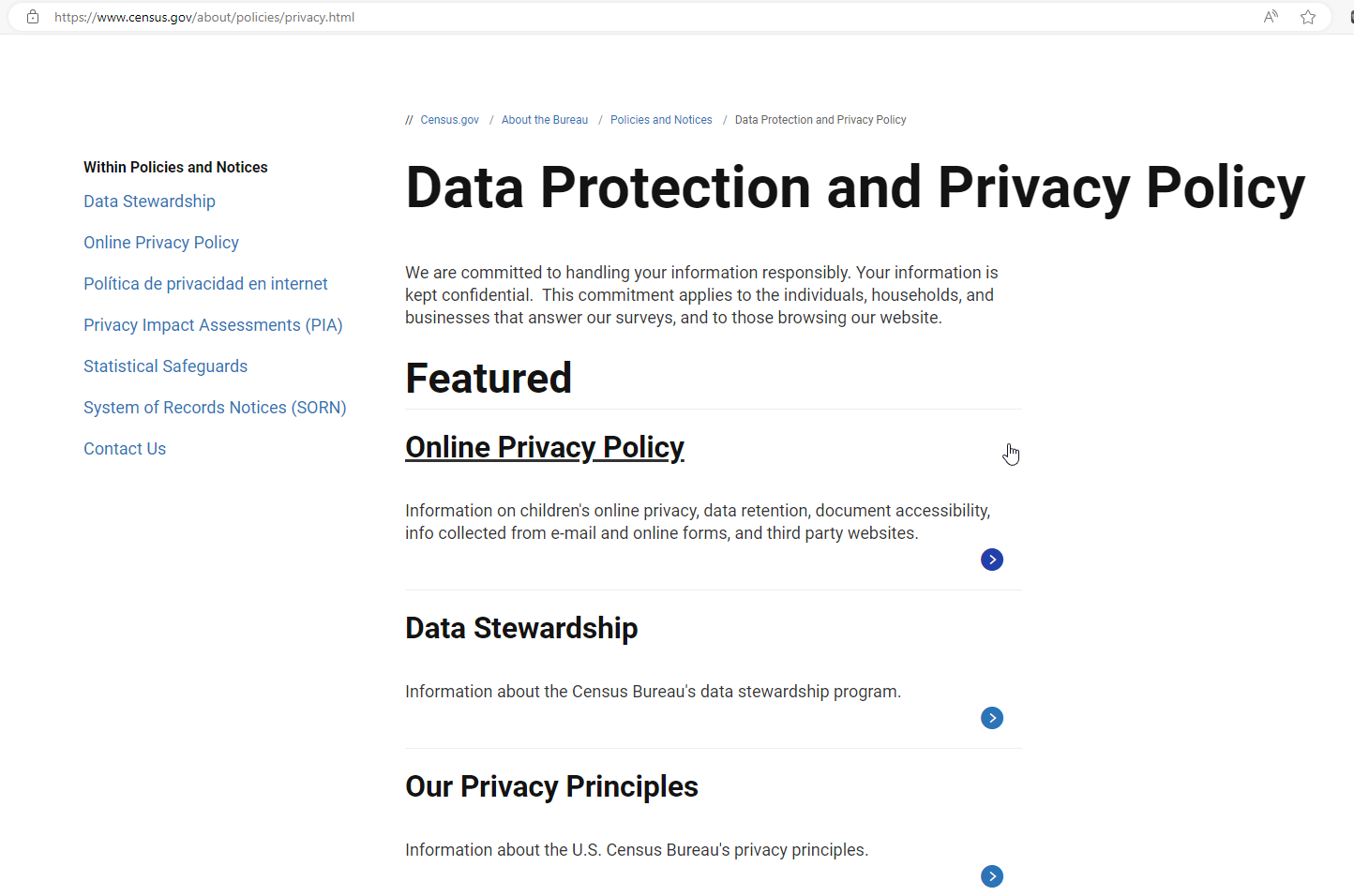Instrument for Round 1 of Cognitive Testing
Generic Clearance for Cognitive, Pilot, and Field Studies for The Office of Juvenile Justice and Delinquency Prevention Data Collection Activities
Attachment B JRFC.CJRP Instrument FINAL
JRFC CJRP 2026
OMB: 1121-0360

Attachment B
Draft
Instrument (10.13.2023)
2025 CJRP/2026 JRFC – Draft Instrument
for Round 1 of Cognitive Testing
Draft Instrument (10.13.2023)
10.13.2023
About the Respondent / Warm-Up Questions


What type of residential facility is the one listed on the front cover? (Select that apply)
Detention center: A short-term facility that provides temporary care in a physically restricting environment for juveniles in custody pending court disposition and, often, for juveniles who are adjudicated delinquent and awaiting disposition or placement elsewhere, or are awaiting transfer to another jurisdiction. In some jurisdictions, detention centers may also hold juveniles committed for short periods of time as part of their disposition (e.g., weekend detention).
Training school/Long-term secure facility: A specialized type of facility that provides strict confinement and long-term treatment generally for post-adjudication committed juvenile offenders. Includes training schools, juvenile correctional facilities, youth development centers.
Reception or diagnostic center: A short-term facility that screens juvenile offenders committed by the courts and assigns them to appropriate correctional facilities.
Group home/Halfway house: A long-term facility that is generally non-secure and intended for post-adjudication commitments in which young persons are allowed extensive contact with the community, such as attending school or holding a job.
Residential treatment center: A facility that focuses on providing some type of individually planned treatment program for youth (substance abuse, sex offender, mental health, etc.) in conjunction with residential care. Such facilities generally require specific licensing by the state that may require that treatment provided is Medicaid-reimbursable.
Boot camp: A secure facility that operates like military basic training. It is designed to combine elements of basic military training programs, correctional components and treatment programs. The emphasis is on strict discipline, drills, and work.
Ranch, forestry camp, wilderness or marine program or farm: These are long-term generally non-secure residential facilities often located in a relatively remote area. The juveniles participate in a structured program that emphasizes outdoor work, including conservation and related activities.
Runaway and homeless shelter: A short-term facility that provides temporary care in a physically unrestricted environment. It can also provide longer-term care under a juvenile court disposition order.
Other type of shelter: This includes emergency non-secure shelters where juveniles are housed short-term until another placement can be found.
Other: This includes independent living programs and anything that cannot be classified above. (Please describe) [textbox]
Length of Stay
Census of Juveniles in Residential Placement
Releases over a Specific Time Period
How many young persons were released from your facility in the 28 days between Thursday September 14, 2023 and Wednesday, October 11, 2023? Please do not include any young persons who were only temporarily released from this facility, such as those released for medical care at a hospital.
Average Length of Stay
What was the average length of stay for the young persons who were released from your facility in the 28 days between Thursday, September 14, 2023 and Wednesday, October 11, 2023?
_____ days
Roster Information for Length of Stay: Excel Spreadsheet

Enter date person was ADMITTED to this facility (MM/DD/YY)
Enter date person was RELEASED from this facility (MM/DD/YY)
Enter where person was released to:
1=Released to another facility
2=Released to the supervision of probation or parole
3=Released without supervision of probation or parole
4=Other, describe
5=Do not know

Facility Classification
Juvenile Residential Facility Census
Does this facility screen young persons to assign them to any of the following? (Select all that apply.)
The appropriate program within this facility
The appropriate living arrangements within this facility
Another facility
A community-based program
None of the above
Does this facility provide any of the following to young persons INSIDE this facility? (Select all that apply.)
A structured program for young persons emphasizing outdoor experiences, such as outdoor work or conservation training
An individually planned treatment program for young persons in conjunction with residential care
A vocation training program, workforce development services, or job training
None of the above
Demographics
Sex
Roster/individual
sex:
Please
enter this person's sex as assigned at birth.
Male
Female
Do you record in your records if a youth is intersex?
Intersex: a person whose sexual or reproductive anatomy or chromosomal pattern does not seem to fit typical definitions of male or female. Intersex medical conditions are sometimes referred to as differences in sex development.
Yes
No
Unknown
Aggregate
sex:
How
many of the youth currently in your facility are the following sexes?
Male __________
Female __________
Gender Identity
Roster/individual
gender identity:
Please
enter this person's gender identity.
Gender
identity is a person's core internal understanding of who they are
regardless of sex assigned at birth.
Male
Female
Transgender
Nonbinary
They use a different term, describe: _______________
Unknown
Aggregate
gender identity:
How
many of the youth currently in your facility identify as the
following gender identities? (Please
select one category per youth.)
Gender
identity is a person's core internal understanding of who they are
regardless of sex assigned at birth.
Male __________
Female __________
Transgender __________
Nonbinary __________
They use a different term __________
Unknown __________
Sexual Orientation
Roster/individual
sexual orientation:
Please
enter this person's sexual orientation.
Sexual
orientation is a person’s emotional or physical attraction to
others.
Straight
Gay
Lesbian
Bisexual
They use a different term, describe: _______________
Unknown
Aggregate
sexual orientation:
How
many of the youth currently in your facility identify as the
following sexual orientations? (Please
select one category per youth.)
Sexual
orientation is a person’s emotional or physical attraction to
others.
Straight __________
Gay __________
Lesbian __________
Bisexual __________
They use a different term __________
Unknown __________
Race
Please
enter this person’s race.
White
Black or African American
Hispanic or Latino
American Indian or Alaska Native
Asian
Native Hawaiian or Other Pacific Islander
Middle Eastern or North African
Two or more races, describe: ____________________
Unknown
Form
Privacy


The confidentiality of the information you provide is protected by federal law (Title 34, Section 10231 of the United States Code) and will only be revealed or used for research purposes (see reverse side for more details).
Wrap Up
We thank you for your time spent taking this survey.
Your response has been recorded.
| File Type | application/vnd.openxmlformats-officedocument.wordprocessingml.document |
| Author | Liz Willhide (CENSUS/ERD FED) |
| File Modified | 0000-00-00 |
| File Created | 2024-08-02 |
© 2026 OMB.report | Privacy Policy